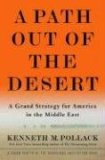
A Grand Strategy for America in the Middle East
by Kenneth Pollack
The greatest danger to America's peace and prosperity, notes leading Middle East policy analyst Kenneth M. Pollack, lies in the political repression, economic stagnation, and cultural conflict running rampant in Arab and Muslim nations. By inflaming political unrest and empowering terrorists, these forces pose a direct threat to America's economy and national security. The impulse for America might be to turn its back on the Middle East in frustration over the George W. Bush administration's mishandling of the Iraq War and other engagements with Arab and Muslim countries. But such a move, Pollack asserts, will only exacerbate problems. He counters with the idea that we must continue to make the Middle East a priority in our policy, but in a humbler, more humane, more realistic, and more cohesive way.
Pollack argues that Washington's greatest sin in its relations with the Middle East has been its persistent unwillingness to make the sustained and patient effort needed to help the people of the Middle East overcome the crippling societal problems facing their governments and societies. As a result, the United States has never had a workable comprehensive policy in the region, just a skein of half-measures intended either to avoid entanglement or to contain the influence of the Soviet Union.
Beyond identifying the stagnation of civic life in Arab and Muslim states and the cumulative effect of our misguided policies, Pollack offers a long-term strategy to ameliorate the political, economic, and social problems that underlie the region’s many crises. Through his suggested policies, America can engage directly with the governments of the Middle East and indirectly with its people by means of cultural exchange, commerce, and other “soft” approaches. He carefully examines each of the region’s most contested areas, including Iraq, Iran, Syria, and Lebanon, as well as the Israeli-Palestinian peace process, and explains how the United States can address each through mutually reinforcing policies.
"Starred Review. A persuasive but painful solution for dealing with the mess in the Middle East." - Kirkus Reviews.
"... an eloquent argument in favor of long-term American involvement in Middle East politics." - Publishers Weekly.
This information about A Path Out of the Desert was first featured
in "The BookBrowse Review" - BookBrowse's membership magazine, and in our weekly "Publishing This Week" newsletter. Publication information is for the USA, and (unless stated otherwise) represents the first print edition. The reviews are necessarily limited to those that were available to us ahead of publication. If you are the publisher or author and feel that they do not properly reflect the range of media opinion now available, send us a message with the mainstream reviews that you would like to see added.
Any "Author Information" displayed below reflects the author's biography at the time this particular book was published.
Kenneth M. Pollack is the director of research at the Saban Center for Middle East Policy at the Brookings Institution. From 1995 to 1996 and from 1999 to 2001, he served as director for Persian Gulf affairs at the National Security Council, where he was the principal working-level official responsible for implementation of U.S. policy toward Iraq, Iran, and the states of the Arabian Peninsula. Prior to his time in the Clinton administration, he spent seven years in the CIA as a Persian Gulf military analyst. He is the author of The Threatening Storm, The Persian Puzzle, Arabs at War, and Things Fall Apart. He lives in Washington, D.C.
Your guide toexceptional books
BookBrowse seeks out and recommends the best in contemporary fiction and nonfiction—books that not only engage and entertain but also deepen our understanding of ourselves and the world around us.